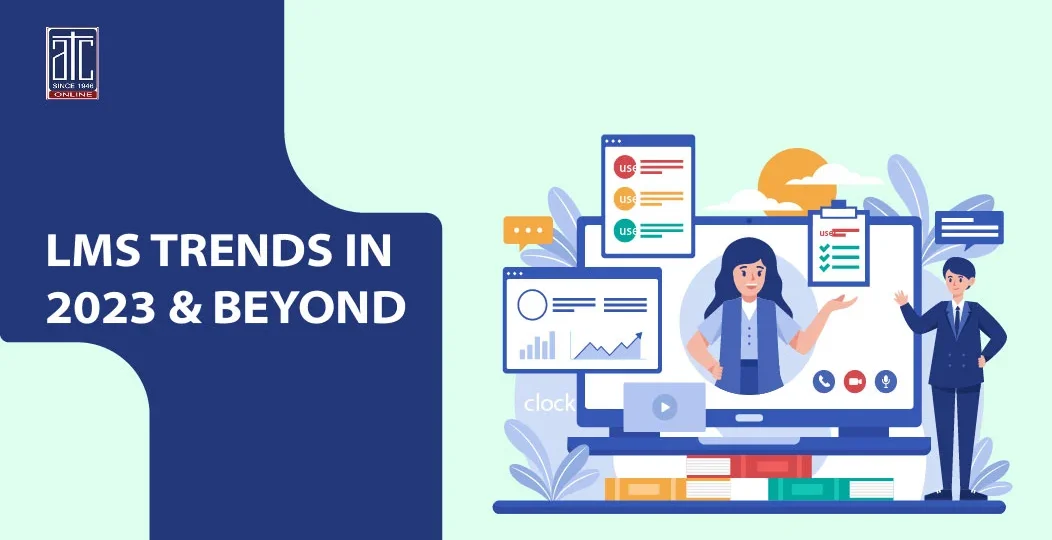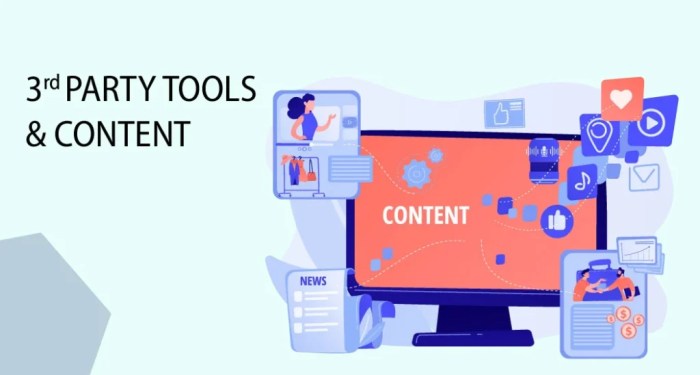
The origins of Learning Management Systems (LMS) can be traced back to the emergence of computer-based training (CBT) in the 1960s. CBT systems allowed for the delivery of educational content through computers, enabling learners to access materials and complete exercises at their own pace.
The evolution of LMS has been shaped by advancements in technology, changing educational needs, and evolving pedagogical approaches. It’s also important to note that the evolution of LMS is an ongoing process, and new technologies and approaches continue to shape the future of online learning platforms. Let us now discuss some of the trends that have been observed in recent years and are likely to continue shaping the LMS landscape in 2023 and beyond.
LEARNING ANALYTICS & ARTIFICIAL INTELLIGENCE

LMS platforms are leveraging learning analytics and artificial intelligence (AI) technologies to gather data on learner behavior, performance, and engagement. This data is then used to provide insights to instructors and administrators, identify areas for improvement, and deliver personalized learning experiences. Here’s how these technologies are being applied within LMS platforms:
- Learning Analytics involves collecting and analyzing data from learners’ interactions with the LMS. This data can include information on course progress, assessment results, time spent on activities, and learner engagement. LMS platforms use learning analytics to gain insights into learner behavior, identify patterns, and make data-driven decisions to improve the learning experience.
- AI technologies, combined with learning analytics, enable the creation of personalized learning pathways within LMS platforms. By analyzing learner data, AI algorithms can recommend specific content, activities, or assessments based on learners’ individual needs, learning styles, and performance.
- AI-powered intelligent tutoring systems can provide personalized guidance and support to learners within the LMS. These systems use algorithms to analyze learner data and deliver adaptive feedback, hints, or remedial content based on individual learner performance. Intelligent tutoring systems aim to mimic the one-on-one interaction between a human tutor and a learner, providing targeted assistance and promoting self-paced learning.
- AI algorithms can analyze learner data and preferences to provide personalized content recommendations within LMS platforms. By understanding learners’ interests, learning styles, and past interactions, AI-powered recommendation systems can suggest relevant courses, resources, or activities that align with learners’ individual needs and goals.
MOBILE LEARNING

Mobile learning is becoming increasingly important as learners expect the flexibility to access content and participate in courses using their smartphones and tablets. LMS platforms are adopting mobile-responsive design and developing dedicated mobile apps to provide seamless mobile learning experiences. Mobile learning within LMS platforms provides learners with flexibility, convenience, and access to learning materials anytime and anywhere.
Mobile Learning allows for seamless integration between desktop and mobile devices, enabling learners to switch between platforms while maintaining their progress and engagement with the course. The mobile learning capabilities of LMS platforms cater to the increasing demand for on-the-go learning and support learners who prefer to use mobile devices as their primary learning tool.
USER EXPERIENCE

User experience (UX) plays a crucial role in the success and effectiveness of a LMS. A positive user experience within an LMS helps to engage and motivate learners. Intuitive and user-friendly interfaces, clear navigation, and visually appealing designs create a pleasant learning environment that encourages learners to actively participate and explore the content. A well-designed LMS enhances learner satisfaction, leading to increased engagement and improved learning outcomes.
LMS platforms will continue placing a strong emphasis on user experience, aiming to create intuitive and user-friendly interfaces for both learners and instructors. Improved navigation, visually appealing designs, and simplified workflows are being continuously prioritized to enhance the overall user experience.
MICRO-LEARNING & BITE-SIZED CONTENT

Micro-learning, which involves delivering content in short, focused bursts, has gained popularity. It worth noting that Micro-learning along with bite-sized content in LMS platforms offer several benefits, including improved engagement, increased knowledge retention, flexibility, and personalized learning experiences. These approaches cater to learners’ preferences for short and focused learning, align with busy schedules, and support just-in-time learning needs.
LMS platforms will increasingly provide the infrastructure and tools to create, deliver, and track micro-learning modules effectively, contributing to efficient and impactful learning experiences. Thus, allowing learners to access information in bite-sized chunks that can be consumed on-the-go.
GAMIFICATION & IMMERSIVE TECHNOLOGIES

Gamification elements, such as badges, leaderboards, and rewards, are being incorporated into LMS platforms to increase learner motivation and engagement. Additionally, immersive technologies like virtual reality (VR) and augmented reality (AR) are being explored to create immersive and interactive learning experiences. By integrating Gamification and immersive technologies into LMS platforms, learners are provided with interactive, engaging, and immersive learning experiences. These approaches promote active participation, motivation, and the application of knowledge and skills, leading to enhanced learning outcomes.
LMS platforms are increasingly offering the infrastructure and tools to seamlessly integrate gamified elements and immersive technologies, creating a dynamic and engaging learning environment.
ACCESSIBILITY & MULTILINGUAL SUPPORT

Accessibility and multilingual support are essential features in a modern LMS to ensure inclusivity and cater to diverse learner populations. Here’s how these features are being increasing incorporated in a modern LMS:
- LMS platforms are supporting screen readers, which enable visually impaired learners to access the content by converting text into speech or braille output.
- Addition of alternative text descriptions for images, videos, and other multimedia elements, ensuring that visually impaired learners can understand the content.
- The LMS interface are increasing becoming navigable using a keyboard alone, enabling learners who cannot use a mouse to access and interact with the system.
- Learners have the option to adjust the font sizes and contrast settings within the LMS to accommodate their visual preferences and needs.
- For video or audio content, closed captions and transcripts are made available, allowing learners with hearing impairments to access the information.
- Provide language localization options, allowing the platform’s interface and content to be presented in multiple languages. Learners can select their preferred language, making the learning experience more accessible and inclusive.
- Support the creation and delivery of learning content in multiple languages. This includes the ability to upload course materials, assessments, and instructions in different languages to accommodate learners who are more comfortable learning in their native language.
- Ability to switch the language settings within the LMS easily. This enables users to navigate the interface, access content, and interact with the platform in their preferred language.
- Creation of assessments and the provision of feedback in multiple languages. This ensures that learners can understand and respond to assessments and receive feedback in their preferred language.
INTEGRATION WITH 3RD PARTY TOOLS & CONTENT

Integration with 3RD party tools and content is an important feature in modern LMS platforms. It allows for a more comprehensive and versatile learning ecosystem by leveraging external resources.
- LMS platforms often integrate with content authoring tools, which allow instructors and content creators to develop interactive and engaging learning materials.
- Integration with video conferencing and webinar platforms enables live virtual classes, webinars, or meetings directly within the LMS.
- Learning Record Stores (LRS) integration allows for the collection and analysis of learning data from various sources. LRS captures and stores learner interactions and experiences outside the LMS, such as interactions with simulations, serious games, or mobile learning apps. This integration provides a more holistic view of learner progress and engagement.
- Integration with CRM systems allows for seamless data exchange between the LMS and the CRM platform. This integration is particularly useful for corporate training or sales enablement, where learner data, progress, and certifications can be synced with CRM systems for tracking and reporting purposes.
- Integration with HRMS platforms streamlines the learner onboarding and off boarding process. Learner data, such as employee profiles, departments, or job roles, can be synchronized between the LMS and HRMS, ensuring accurate and up-to-date learner information.
- LMS platforms often integrate with SSO and identity providers, such as Google, Microsoft, or LDAP (Lightweight Directory Access Protocol). This integration allows learners to use their existing credentials to access the LMS, simplifying the login process and ensuring consistent user management across different systems.
CONCLUSION
It’s important to note that these trends may continue to evolve and new trends may emerge as technology and learning needs progress. Stay updated with the latest developments in the LMS industry to ensure you are leveraging the most relevant features and capabilities for your learning initiatives.
The PACIFYCA LMS from ATC ONLINE is one of the finest in its class, thanks to its open architecture and ease of use. We offer full-service consultation and customization for our e-learning systems, along with a guarantee of a successful on-site deployment. For more information on PACIFYCA, please visit us at: http://atconline.biz/products/e-learning-management/
For commercial inquiries and product information, please contact us at https://atconline.biz/contact/
















